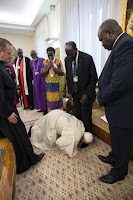NOTE, This means that Nairobi, Kenya (where UN SRSG Volker Perthes has set up an office :) will begin hosting delegations of politicians, civil society, community-based organisations and opinion leaders to deliberate on returning Sudan to the democratic process. Friendly Kenyans are popular.
Interestingly, Kenya-South Sudan relations are bilateral relations between South Sudan and Kenya. South Sudan is a strategic partner of Kenya in many areas. Both countries have cultural similarities as many people from South Sudan lived in Kenya before independence.
Read more in the report here below.
Photo: When Kenya President William Ruto shook hands with South Sudan President Salva Kiir after he was inaugurated as the 5th president of Kenya at Kasarani Stadium. [PCS]
Source: The Standard 1mo ago ’Sudan violence: Ruto, Kiir and Guelleh to broker peace deal in Khartoum’
_____________________________
Report at The Standard standardmedia.co.ke
Dated Tuesday 13 June 2023 - full copy:
Igad picks Kenya to spearhead peace, democratic transition in Sudan
Photo: When Malik Agar, deputy leader Sudan’s Transitional Sovereign Council signs visitors book after he arrived at JKIA on May 28, 2023. [Mwangi Maina, Standard]
Kenya has been picked to spearhead the dialogue between warring factions in Sudan and take the conflict-ridden country towards a democratic political dispensation at the Intergovernmental Authority on Development (Igad) summit in Djibouti.
This means that Nairobi will begin hosting delegations of politicians, civil society, community-based organistions and opinion leaders to deliberate on returning Sudan to the democratic process.
During consultations with members of the Igad High-Level Delegation on the ongoing political situation in Sudan, they agreed that Kenya should commence a two-track conflict resolution process in the interim to resolve the current crisis and bring the voice and aspirations of the people of Sudan for a democratic transition in line with the Political Framework Agreement.
"Revitalizing the dialogue towards a democratic political dispensation. As I have indicated from the start Kenya will be honored to facilitate this track. I am confident that the successful implementation of these two tracks will lead to the resumption of the final phase of the political process," said President William Ruto while making his Trilateral proposal on Sudan.
An armed conflict between rival factions of the military government of Sudan began on April 15, when clashes broke out in cities, with the fighting concentrated around the capital city of Khartoum and the Darfur region.
Thousands of people have been killed and many more injured following attacks by the paramilitary Rapid Support Forces (RSF) on government sites. Airstrikes, artillery, and gunfire were reported across Sudan including in Khartoum.
RSF leader Mohamed Hamdan "Hemedti" and Sudan's de facto leader and army chief Abdel Fattah al-Burhan have disputed control of government sites, including the general military headquarters, the Presidential Palace, and Khartoum International Airport.
All the proposals by Kenya were adopted including the declaration of an unconditional ceasefire where Ruto noted that the step was crucial to facilitate a negotiated settlement of the dispute, preventing further loss of life, destruction of property, and damage to critical infrastructure.
The proposal he said will also ensure that the people of Sudan have access to essential public services that are necessary for their well-being.
Other proposals adopted by the Igad special summit include the establishment of a humanitarian demilitarized green zone spanning a radius of thirty 30 to 50 kilometers in Khartoum, to facilitate the delivery of humanitarian assistance to the victims of the conflict and establish an IGAD-Led mechanism to monitor and provide security for the green zone.
Ruto asked the international community to support this green/demilitarized zone and urged the UN to scale up humanitarian assistance and engage with the people committees on the ground to ensure that aid is effectively targeted and delivered to those who are in dire need of support.
The Kenyan government's proposal that was adopted was to have Southern Sudan President Salva Kiir lead a mediation between the leadership of the SAF and RSF.
"I would propose that President Kiir makes arrangements for the 3 of us to meet with the two Generals, or their representatives, at a convenient place or even virtually, to secure their commitment to peace. In order to secure the entire country, this line of action should build on the Juba process and continue engaging with all armed groups in Sudan to prevent them from becoming spoilers to the process," said Ruto.
Ruto said that the conflict continued unabated with disproportionate humanitarian crises and unprecedented negative spillover effects in our region.
"Until now, the efforts made to halt the war have been unsuccessful. Six ceasefires in total have failed to remain intact. Regrettably, the conflicting parties have not fully embraced and adhered to the ceasefire.
Unfortunately, despite a recent announcement of a 24-hour ceasefire on Friday evening, all indications point to an escalation of the conflict since Saturday, rather than de-escalation," said the President.
Presently, Ruto said, Khartoum was experiencing extensive destruction, as strategic installations are being destroyed and residential properties are being converted into command centres and the civilian population was being forcibly engaged in the war effort.
He noted that it was disturbing that the civilians are also enduring incidents of robbery, rape, physical violation, and even murder which must be condemned, as they go against the laws of war that mandate combatants to safeguard civilians, facilitate humanitarian assistance, and protect strategic and service installations.
"Our region is beginning to feel the effects of the war, which include the displacement of Sudanese citizens and the strain on trade relations and other forms of cooperation. As a result, it is incumbent upon us to take the lead in resolving this crisis. We must stand in solidarity with Sudan and work towards the restoration of peace and the advancement of development for its people," said Ruto.
Play video: https://youtu.be/w63KuE2wev4
Related reports
Ruto urges African nations to tackle climate change together
Why teachers do not want to head schools
View original: https://www.standardmedia.co.ke/africa/article/2001475049/igad-picks-kenya-to-spearhead-peace-democratic-transition-in-sudan
[Ends]












